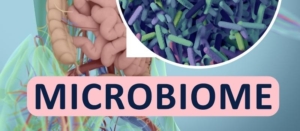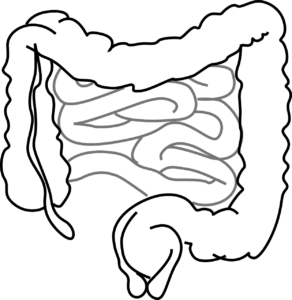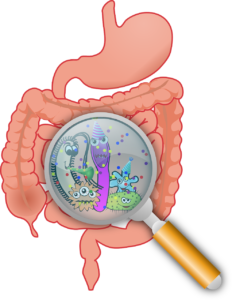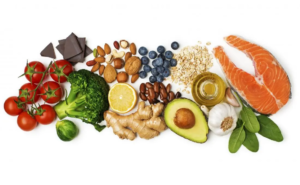So Let’s look at Inflammatory health conditions.
The simple cold, depression, and hayfever are all inflammatory health conditions
However, there is something more unusual that connects the three.
Surprisingly enough,
All three are influenced by your gut microbiome, the microorganisms that call your digestive tract ‘home’.
You may be wondering how these tiny gut inhabitants could have any effect on your respiratory system or brain.
In this article, we will find out how your gut influences these seemingly unrelated areas, as well as how to prevent your gut from making you sick, sad, or inflamed.
Your Gut and Immune System Work Hand-in-Hand
Your immune system’s main job is to defend you from pathogens (disease-causing microorganisms).
Since pathogens are typically inhaled or swallowed, it makes sense for the immune system to concentrate on your respiratory and digestive tracts.
In fact, 70% of the immune system is housed in your gut.
It lies beneath the lining of your intestines, ready to spring into action if a pathogen enters your gut, to try to prevent you from getting sick.
By contrast, some bacteria have a positive influence on your immune system.
A healthy gut microbiome interacts with the intestinal immune system in ways that increase your body’s immune defenses.
A microbiome out of balance, which does not contain high amounts of beneficial bacteria, is less likely to help you resist infection, including colds and flu.
Fortunately, certain types of probiotic bacteria improve the bacterial balance in your gut, with beneficial flow-on effects for your immune system.
Lactobacillus rhamnosus (LGG®), Lactobacillus paracasei (8700:2), and Lactobacillus plantarum (HEAL 9) all stimulate the immune system and improve resistance to infection.
In fact, the combination of 8700:2 and HEAL 9 has been shown to reduce the severity and duration of common cold symptoms.
If you struggle with frequent colds and flu, it is wise to find out How to Heal Your Gut. And so, working with a naturopath at Your Wellness Centre to strengthen your gut microbiome may help.
‘A healthy gut microbiome interacts with the intestinal immune system in ways that increase your body’s immune defenses.
However, a microbiome out of balance, which does not contain high levels of beneficial bacteria, is less likely to help you resist infection, including colds and flu (click here to read more about your gut microbiome).’

Where Does The Overactive Immune System fit in?
Another possible consequence of poor gut bacterial balance is inflammation, a key feature of autoimmune (e.g. rheumatoid arthritis) and allergic diseases (e.g. hayfever).
In these conditions, the immune system misidentifies harmless substances as threats and stimulates an immune response against them.
The resulting inflammation creates the symptoms you associate with allergy and autoimmunity, e.g. a blocked nose and watering eyes in hayfever, or joint pain and swelling in rheumatoid arthritis.
Fortunately, certain probiotic strains, namely LGG® and Lactobacillus paracasei (LP-33®), can stimulate your immune system to produce anti-inflammatory compounds, reducing inflammation and symptoms.
For example, research in hundreds of people has shown that LP-33® significantly improves hayfever symptoms.
Interestingly, LGG®, when taken during pregnancy and breastfeeding, can reduce the incidence of eczema (an inflammatory skin disease) in children, by supporting the healthy development of the gut microbiome and the immune system.
If your immune system is in overdrive, to reduce symptoms, find out How to Heal Your Gut. Making an appointment with a Naturopath at Your Wellness Centre for this, will help bring it back into line.
The Gut and Inflammation have been linked with depression.
You know the “butterflies” in the stomach or knots in the stomach feeling when you are nervous?
Well this has led researchers us to connect the gut and inflammation with depression.
And more and more, research is finding inflammation in the body as well as the brain as an unexpected cause of depression.
Also, the interaction between bad gut bacteria and the immune system can cause inflammation.
We also now know that the inflammatory chemicals released in your gut can also cause an inflammatory response in your brain?
If gut inflammation can influence mood, you may be wondering if specific probiotics can improve mood or reduce the symptoms of depression.
While this is a hot topic in scientific research, we do not currently know which specific probiotic strains can influence mood.
However, a good start in supporting a healthy mood is taking steps to heal your gut and reduce inflammation in the body.
What we do know is maximising your gut health, e.g. eating plenty of fibre-rich whole foods (your gut bacteria’s preferred food), can also increase the numbers of good bacteria, which is the best way to influence your mood via your gut.
If your bacterial balance has become disrupted due to a stomach bug, antibiotics, or other causes, strains that support beneficial bacteria, such as LGG®,
Saccharomyces cerevisiae var. boulardii, and Bifidobacterium animalis ssp lactis (BB-12®) may help improve the composition of your gut microbiome.

Great Health Starts in the Gut
By interacting with your immune system, your gut bacteria influence your ability to resist infection, reduce inflammation, and maintain a healthy mood.
If you are wondering whether your gut may be making you sick, sad, or inflamed, make an appointment with a natural healthcare practitioner at Your Wellness Centre today.
Together, you can assess your bacterial balance, and make a plan to improve your specific symptoms.







 But, if your gut microbiome (or gut ecosystem) is not as good as it could be and needs a little attention, life in general and even your waistline may be quite uncomfortable.
But, if your gut microbiome (or gut ecosystem) is not as good as it could be and needs a little attention, life in general and even your waistline may be quite uncomfortable. Dysbiosis and bloating have also been linked with digestive disorders such as
Dysbiosis and bloating have also been linked with digestive disorders such as 
 They are found in foods such as tea, wine, chocolates, fruits, vegetables, and extra virgin olive oil, just to name a few.
They are found in foods such as tea, wine, chocolates, fruits, vegetables, and extra virgin olive oil, just to name a few. An imbalance in the gut microbiota is linked to numerous health conditions, both within the gut and
An imbalance in the gut microbiota is linked to numerous health conditions, both within the gut and 